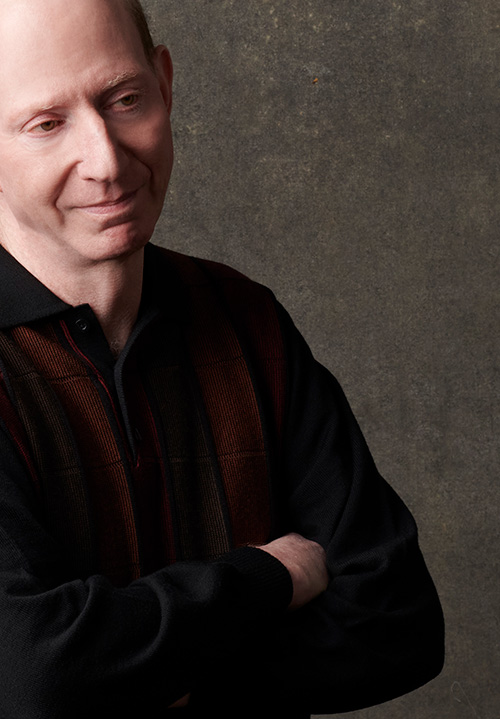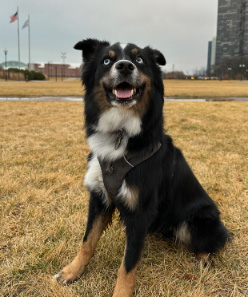
Marty grew up in Beachwood, Ohio, in a quiet suburban home that was later demolished to make way for a fancy mall. After heading east for college, he returned to the Midwest for law school and has remained there ever since. He started his legal career at a brand name firm in Cleveland, but soon moved to Chicago to join a creative boutique start-up, hoping for a better work-life balance. That gamble paid off as the little firm flourished and he became a partner.
After many happy years there, he opened his own law firm, going solo so he could divide his time between lawyering and pursuing a lifelong dream of writing legal thrillers. These days Marty works from home, which he shares with an adorable Australian Shepherd named Frodo.
Princeton University
(1984) (A.B. in political philosophy & public policy)
Univ. of Michigan Law School
(1987) (Order of the Coif)
No, I opened Harris & Affiliates in 2009. Before that, most of my career was at Connelly Sheehan Harris (“CSH”), a boutique employment litigation firm with a dozen attorneys. CSH was unique and I loved my time there. Sandwiched around my CSH days were two stints at national mega-firms, so I’ve run the full gamut.
Several stand out fondly. If I have to pick one, it’s when a smooth-talking salesman dodged every blow I tried to land during the first few hours of my cross-examination—which had never happened before. To overcome what he was doing to wiggle away, I literally had to invent a brand new cross-exam technique—overnight, in the middle of the trial. The next day, I crushed him. Now that was fun!
Do you know someone who loves taking things apart just to figure out how they work? That’s me. But instead of mechanical objects like cars or guns, I dissect lawyering techniques. I’ve spent thousands of hours breaking down the tactics they teach lawyers, figuring out exactly why certain things work—and then I re-engineered them, developing ways to improve and defeat those techniques. That’s how I polished up my cross-examination methods. That’s how I created “self-defense” lessons for my witnesses, so they can beat standard cross-exam techniques. That’s how I developed novel approaches to writing legal briefs. A few of these things came naturally, but most are the fruit of hard work.
Mickey Haller (the “Lincoln Lawyer” in Michael Connelly’s series), with Sandy Stern a close second (from Scott Turow’s books). IMO, Maxwell Grue, the protagonist in my first novel, is every bit as skilled as those two, but readers will have to judge for themselves.
Their technique is superb and authentic. Most fictional lawyers, such as Perry Mason or the ones on Law & Order, ask long, argumentative questions that would never work in a real courtroom—but their fictional witnesses always follow the script, breaking down and confessing. In real cases, opposing witnesses fight you all the way. You can’t beat them with long speeches that invite them to argue back. You beat them with a series of short, tightly worded questions that force them to answer “yes or no”—giving them no chance to explain or justify anything—and then you string those facts together until, collectively, they paint a compelling picture. When done expertly (which is rare, both in real courtrooms and books), it’s riveting, because you can feel the vise tightening around the bad guy’s neck despite how hard he’s fighting.
Once. I know, I just said it “never” happens in real life, but I swear, it did in one of my trials. I got there with a string of those tight “yes-or-no” questions, though, not with argumentative speeches a la Mr. Mason. Ironically, the question that got the admission was a throwaway. I’d just finished demonstrating multiple problems with the plaintiff’s performance. As a transition to the next segment of my cross, I asked, “Despite all that, you really believe you deserved the promotion?” As soon as he started thinking, I realized the case was over. It no longer mattered what he said; everyone knew that even he no longer believed in his case. After five or six seconds, he finally said, “No, I guess I didn’t.” Game over.
I’ve always loved writing. In fact, I started my career as an appellate specialist; for several years, all I did was write legal briefs and conduct legal research, until I got the itch and started doing trials, too. Also, one of my nieces started writing novels, and I helped her. Watching a 12-year-old do it (quite well) convinced me that I could, too.
The clincher was a comment from a friend who knew I was thinking about giving it a try. “You’re so creative in real cases,” she said, “even when shackled by real world constraints. Just think what you could do if the only limit was your imagination!” I decided to find out.
Wow, it’s hard to pick one thing. I love creating intricate plots with roller coaster twists: planning how the murder goes down, what clues to drop, when to drop them. Learning new skills has been amazing, too. Some parts of fiction writing came naturally to me—creating twisty plots, writing easy-to-read sentences—but others didn’t. As I mentioned, I live for the challenge of breaking things down and figuring them out.
You may have noticed, I haven’t mentioned the actual writing itself (yet). At first, putting the words on paper was my least favorite part; you might even call it a chore. Eventually, though, I developed a process that works for me. Now, when I get on a roll, I often stay up all night to keep writing because I’m having so much fun.
Absolutely. Obviously, it helps to know the law and court procedures. Even more important is mastery of key legal skills, especially the technique required for devastating cross-examinations. Expert technique makes trial scenes riveting, both for readers and real jurors. A number of jurors have thanked me after trials, saying I made it far more exciting than the other times they had jury duty.
My unique style of lawyering has also nurtured my creative side. That comes in handy for an author. Last but not least, handling real cases taught me the importance of paying attention to every last detail, no matter how trivial it seems. It’s easy to see how that habit helps when dropping clues in a novel. Overall, I think several legal skills have translated well, but again, readers will have to judge for themselves.
Not for the “lawyering” part of the job, skills like how to write a brief or cross examine a witness, but there were a few “Eureka!” moments when I learned valuable lessons from people who briefly crossed my path. My favorite is when a seminar instructor taught me the most important cross examination technique by having me interrogate a door. Seriously! On the other hand, when it comes to the business side of running a law firm, my former law partner, Michael Sheehan, was an invaluable mentor. That aspect of being a lawyer did not come naturally to me.
Raising the cutest dog you’ll ever see, a 5-year-old Australian Shepherd named Frodo. We spend hours every day taking long walks and playing fetch in a nearby park.
I also love playing cards, especially bridge. I’m a serious player, traveling the country to compete in big tournaments. Bridge, chess, and lawyering share one thing in common: you need to anticipate your opponent’s next move, figure out counters. That’s another skill that comes in handy for writing legal thrillers.
